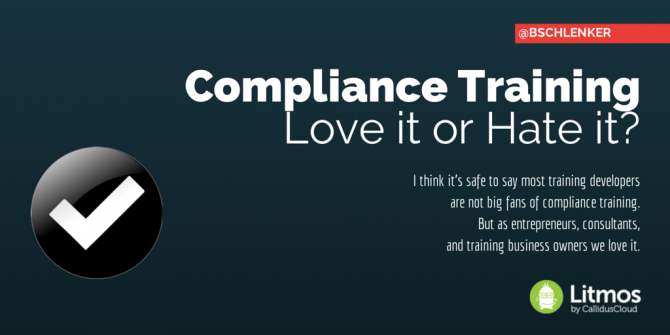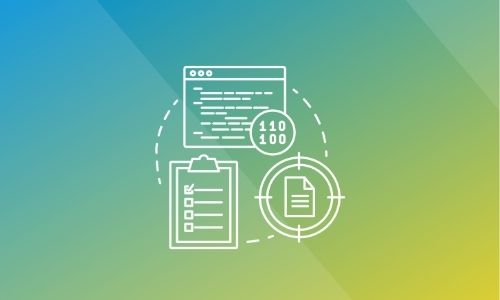Compliance Training: Love it or Hate it?
I often find myself in conversations about developing training courses. They are always fun but inevitably contain the comment, “yeah, but we can’t do that because this is a compliance course.” I’ve even found myself adding “…unless you’re developing a compliance course” at the end of statements during my presentations. As passionate proponents of LEARNING, I think it’s safe to say most training developers are not big fans of compliance training. But as entrepreneurs, consultants, and training business owners we love it.
What is Compliance Training
Compliance training is a category of training content products that are mandatory for employees. The mandate is usually part of state, or federal law. But let’s also remember that compliance training is always mandatory while mandatory training is not always compliance training. As the learner, you aren’t consuming the information because you want to learn. You’re taking the course because you want to check the box stating that you’ve completed the requirement.
In preparation for a presentation on this topic, I did a search for “mandated training laws”, or something like that. One of the first items was an article from August 2013 from a webzine in New Jersey called NJSpotlight. the article stated that Governor Chris Christie had signed a law mandating 2 hours of training…ANNUALLY… in Dyslexia and other reading disorders to all general education teachers in per-K through 3rd grade, special ed, and reading teachers. Perfect.
If you like to geek out on politics and legalese, here is the exact wording from the law:
“2. The State Board of Education shall, as part of the professional development requirement established by the State board for public school teaching staff members, require certain teaching staff members to annually complete at least two hours of professional development instruction on the screening, intervention, accommodation, and use of technology for students with reading disabilities, including dyslexia. The professional development requirement established pursuant to this section shall apply to general education teachers employed in grades kindergarten through 3, special education, basic skills, and English as a second language teachers, reading specialists, learning disabilities teacher consultants, and speech-language specialists. A board of education may make the professional development opportunities available to other instructional or support staff as the board deems appropriate.”
Compliance Training is Different
This is why compliance training is different. The key driver is an external motivator, the law. In the case of the NJ DOE law, the ideal is that proactive teachers, passionate about their work and their students, would be INTERNALLY motivated to learn about dyslexia on their own. But, apparently, this was not the case in New Jersey, and so a law was created to force yearly participation in a 2-hour training event.
With very good intentions, our laws make the creation of a training event mandatory, while the learning is not. The learning is assumed. This is one of the frustrating realities of our industry. This is also why I created a short list of items on how I view the Learning & Development industry…just to keep me sane. If you ever lose your way, just remember these 4 statements to get your mind right.
- Training is an event
- Learning is a process
- eLearning supports them both
- Performance is the goal
A quick recap. Learning is an individual, messy, long term process, and proving one’s learning is equally messy and complicated. Training on the other hand, can be defined with specific time constraints, and require well defined objectives, and content…with a quick, automated, multiple choice test at the end. The training event can occur to meet the arbitrary legal requirements without much concern for proving that learning occurred, or that behaviors were changed.
Is this a bad thing? In the case of New Jersey DOE, from what I read, it was a good thing. Compliance training was only part of the legal solution to a district wide problem with ignoring the realities of learning disabilities. A 2 hour mandatory training event would at the very least expose the educators to dyslexia in a consistent manner across the district.
Compliance Training Should be Embraced
Over the years, and many experiences of my career, I’ve come to understand a much broader view of our industry. Compliance training is only one of the many parts of our industry. And it’s an important part. It has different drivers, requires different solutions, and exists for different reasons. Without the laws and other requirements for compliance training I believe much of our industry would not exist.
As a designer/developer of training you can embrace compliance training for what it is, and work within those boundaries or not. You’ll find that there is usually very little room for creativity, but it’s there if you look hard enough.
As the head of a training department you will need a learning management system that can easily manage content, people, and reports. You may decide to purchase a pre-made compliance course, or develop your own. Having an LMS that handles both solutions seamlessly will be important. A simple, user-friendly SaaS LMS like Litmos gets it all done and then some.
If you have created compliance training you are proud of, please contact me. I’d love to hear about your experience. Or just send a tweet with #askBrent @bschlenker.





